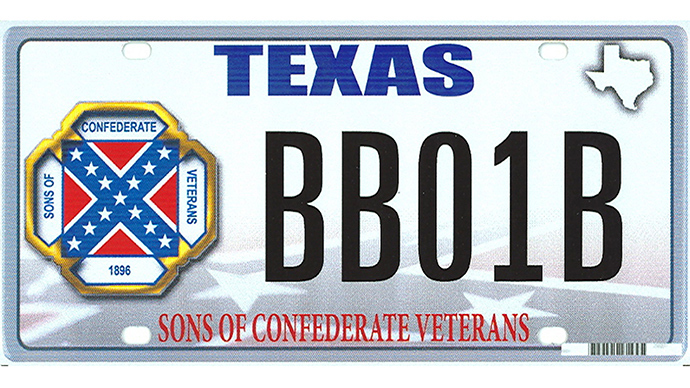Dixie’s flag falls again: Supreme Court rules Texas can reject offensive plate designs

The nation’s highest court agreed with Texas’ refusal to issue a driver’s license plate bearing the Confederate flag. The ruling rejected a free speech challenge saying government property is a protected statement.
In a 5-4 decision, the Supreme Court ruled on Thursday that specialty plates convey a state’s endorsement of particular speech. The case, Walker v. Sons of Confederate Veterans (SCV), involved the SCV wanting a Texas driver’s license plate bearing its logo with a Confederate flag. A state board rejected its design over concerns that the license plate would offend many Texans.
The Confederate flag has a double association. For some, it is a hate symbol: a reminder of a legal system of slavery and mass murder in the South. For others, it’s a symbol of heritage and history deriving from the American Civil War, in which America’s southern states adopted the flag as they tried to secede from the North 150 years ago.
“A person who displays a message on a Texas license plate likely intends to convey to the public the State has endorsed that message. If not, the individual could simply display the message in question in large letters on a bumper sticker right next to the plate,” wrote Justice Stephen Breyer in the majority opinion, joined by Justices Clarence Thomas, Ruth Bader Ginsburg, Sonia Sotomayor and Elena Kagan.
Whoa, Thomas joins SCOTUS liberals to hold that Texas can refuse Confederate flag license plate, per SCOTUSblog
— Liz Goodwin (@lizcgoodwin) June 18, 2015
Justice Clarence Thomas, often the most conservative opinion on the bench, teamed up with the liberal justices. He has sided with liberal opinions in the past, typically when the case concerns private property or the rights of criminal defendants.
Justice Stephen Beyer said that when a message appears on license plates, it becomes a government statement and not a private individual’s. The court further ruled that the government has to be able to speak in order to function.
“As a general matter,” Justice Breyer wrote, “when the government speaks it is entitled to promote a program, to espouse a policy or to take a position.” He said a government without such authority wouldn’t be able to enforce a vaccination program or encourage householders to participate in a recycling program.
READ MORE: Confederate flag battle reaches the Supreme Court
Justice Samuel Alito said in the dissent that the decision “threatens private speech that the government finds displeasing.” Alito, joined by Chief Justice John Roberts and Justices Antonin Scalia and Anthony Kennedy, argued that custom Texas license plates do not imply an endorsement by the state whatever message the plate carries.
“If a car with a plate that says ‘Rather Be Golfing’ passed by at 8:30 am on a Monday morning, would you think: ‘This is the official policy of the State – better to golf than to work?’” the dissent reads.
Like many US states, Texas provides custom license plates for an additional fee, but the designs have to be approved by the state board governing the Department of Motor Vehicles. The controversial Confederate flag design is the first that it has ever rejected.
Texas offers hundreds of specialty plates. Many are for college alumni, sports fans, businesses and service organizations. Others convey messages such as “Choose Life,” “God Bless Texas” and “Fight Terrorism.” The license plates are, Justice Alito wrote, “little mobile billboards on which motorists can display their own messages.”
The Confederate “battle flag” currently appears on license plates in Alabama, Georgia, Louisiana, Maryland, Mississippi, North Carolina, South Carolina, Tennessee and Virginia.












